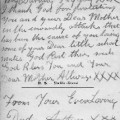A Soldier’s Fears about the Home Front
15 September 2014
Air Raid on Upper North Street School, Poplar
Arthur Baldock’s postcard shows that worries and fears about the war travelled in both directions. In this case Arthur, serving on the western front, had heard about the air-raid on Poplar on 13 June 1917, which killed 162 civilians, the highest death toll from a single First World War air raid. Amongst those civilians were 18 children killed when a single bomb fell on their school in Poplar.
The post card was kindly supplied by Arthur Baldock’s granddaughter, Loughborough resident Pamela Kinna. He sent it to his son Arthur, nicknamed ‘Tiggy’, at the family home in Poplar.
The raid on Poplar was the first carried out by aeroplanes. Before it there had been 52 Zeppelin raids on the UK, killing 556 people and injuring 1,357.
The local newspaper commented on the attack as follows:
‘Death From The Sky. The morning of Wednesday June 13 1917 was hot, and the sky was hazy. Nevertheless, onlookers in London’s East End were able to see ‘a dozen or so big aeroplanes scintillating like so many huge silver dragonflies’. These three-seater bombers were carrying shrapnel bombs; that morning they killed 104 people.
Sixteen of the dead were 5- and 6-year olds, in their classroom at Upper North Street School, Poplar; two older children also died. ‘The sun had been shining, and then it seemed to go out in a roar of thunder.’’
The following week crowds lined the streets to witness the passing of the funeral cortège and in June 1919, a memorial was unveiled in Poplar Recreation Ground to commemorate the 18 children killed.
Discover more:
Find out more about WW1 silk postcards.
Read about the bombing of Upper North Street School, see the postcard which commemorates the funeral procession and read about the memorial to the children who lost their lives.
Hear 90-year-old Jack Brown, aged 6 at the time of the raid, recall his memories of the incident and learn about the history of this and other WW1 air raids on the UK as described by the BBC Timewatch programme.

